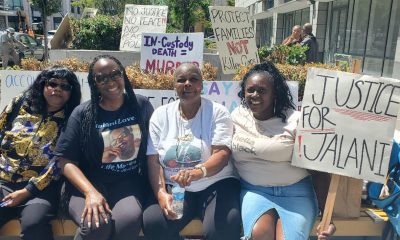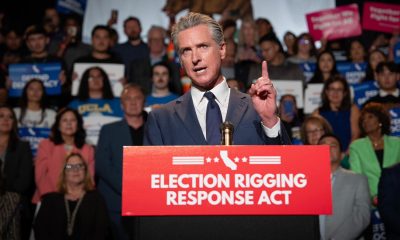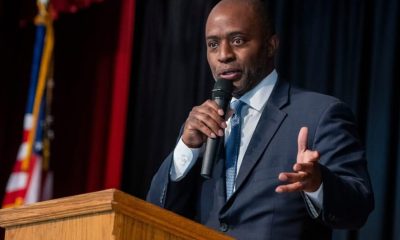Oakland
REJECT Libby Schaaf’s Election Picks

The following commentary is mine and mine alone. I do not speak for the Jobs and Housing Coalition or The McConnell Group’s clients.
I recently read Libby Schaaf’s Election Guide. She promotes California Proposition 21 (Prop 21) which will undermine the progress made by Governor Newsom and the legislature to create rent control reforms that bipartisan groups supported.
Prop 21 will deliver a death blow to investment in Oakland and discourage new housing developments and devastate small property owners. This will come at a time when the city desperately needs new revenues that create housing and job opportunities for residents who are suffering enormous losses caused by the Covid -19 pandemic. If Prop 21 passes, Oakland will suffer the loss of millions of dollars in affordable housing impact fees.
“Proposition 21, like Proposition 10 before it, runs the all-too-real risk of discouraging availability of affordable housing in our state,” said Governor Newsom.
Social justice and affordable housing advocates and virtually every major newspaper in the state agree. This includes the NAACP, Hispanic Chamber of Commerce, California Council on Affordable Housing, San Francisco Chronicle, East Bay Times, The Mercury News and many other social justice groups and editorial boards.
Libby is out there on her own on Prop 21 and I encourage Oaklanders not to join her.
In an equally disturbing development, Libby has chosen to stand against her colleagues on another major issue. The Metropolitan Transit Commission has proposed adoption of a remote working mandate that would require companies to have 60% of their employees permanently work from home. San Francisco Mayor London Breed, Sam Liccardo of San Jose, and Bay Area political leaders like Nancy
Skinner, Buffy Wicks and Rob Bonta oppose the mandate. https://sd11.senate.ca.gov/news/20201014-bay-area-letter-mtc-regarding-potential-work-home-mandate.
Libby says beating back climate change with a telework mandate is more important than any possible business profits it could hurt. Tell that to food service workers who cannot wait to get back to work post-COVID, and to office cleaners, security guards, commercial real estate brokers, fitness trainers, and all the other people whose jobs depend on downtown offices. All of them will permanently lose jobs when Oakland offices shut down.
I support voluntary remote work. But a permanent mandate goes too far. It is bad for everyone in Oakland, the Bay Area and the state.
Perhaps Libby’s contrarian support for bad policies explains a recent Jobs and Housing Coalition poll that revealed most Oaklanders disapprove of her leadership of the city. Where she once had an approval rating of 72%, she has fallen to 44%.
Fifty percent of voters disapprove of her job performance with 26% of voters strongly disapproving. Most Oaklanders (52%) also say the quality of life in Oakland has declined over the past several years while she has been Mayor. These negative sentiments are highest amongst blacks, browns, women, democrats, independents and homeowners. Notably, pessimism with Libby’s leadership extends to people who identify as progressives.
Libby has abandoned the moderate principals she ran on which catapulted her to high approval and popularity in Oakland. Now, moderates feel abandoned and people of color, led by African Americans, are greatly disappointed.
Given her plummeting polling numbers, maybe Libby’s picks don’t matter. Maybe disappointed voters will consider how Oakland is failing on her watch and they will vote the opposite on anything she suggests. I certainly hope so when it comes to Prop 21 and permanent remote work mandates.
Greg McConnell is the president and CEO of The McConnell Group and principal consultant and advocate.
Activism
OP-ED: AB 1349 Puts Corporate Power Over Community
Since Ticketmaster and Live Nation merged in 2010, ticket prices have jumped more than 150 percent. Activities that once fit a family’s budget now take significant disposable income that most working families simply don’t have. The problem is compounded by a system that has tilted access toward the wealthy and white-collar workers. If you have a fancy credit card, you get “presale access,” and if you work in an office instead of a warehouse, you might be able to wait in an online queue to buy a ticket. Access now means privilege.

By Bishop Joseph Simmons, Senior Pastor, Greater St. Paul Baptist Church, Oakland
As a pastor, I believe in the power that a sense of community can have on improving people’s lives. Live events are one of the few places where people from different backgrounds and ages can share the same space and experience – where construction workers sit next to lawyers at a concert, and teenagers enjoy a basketball game with their grandparents. Yet, over the past decade, I’ve witnessed these experiences – the concerts, games, and cultural events where we gather – become increasingly unaffordable, and it is a shame.
These moments of connection matter as they form part of the fabric that holds communities together. But that fabric is fraying because of Ticketmaster/Live Nation’s unchecked control over access to live events. Unfortunately, AB 1349 would only further entrench their corporate power over our spaces.
Since Ticketmaster and Live Nation merged in 2010, ticket prices have jumped more than 150 percent. Activities that once fit a family’s budget now take significant disposable income that most working families simply don’t have. The problem is compounded by a system that has tilted access toward the wealthy and white-collar workers. If you have a fancy credit card, you get “presale access,” and if you work in an office instead of a warehouse, you might be able to wait in an online queue to buy a ticket. Access now means privilege.
Power over live events is concentrated in a single corporate entity, and this regime operates without transparency or accountability – much like a dictator. Ticketmaster controls 80 percent of first-sale tickets and nearly a third of resale tickets, but they still want more. More power, more control for Ticketmaster means higher prices and less access for consumers. It’s the agenda they are pushing nationally, with the help of former Trump political operatives, who are quietly trying to undo the antitrust lawsuit launched against Ticketmaster/Live Nation under President Biden’s DOJ.
That’s why I’m deeply concerned about AB 1349 in its current form. Rather than reining in Ticketmaster’s power, the bill risks strengthening it, aligning with Trump. AB 1349 gives Ticketmaster the ability to control a consumer’s ticket forever by granting Ticketmaster’s regime new powers in state law to prevent consumers from reselling or giving away their tickets. It also creates new pathways for Ticketmaster to discriminate and retaliate against consumers who choose to shop around for the best service and fees on resale platforms that aren’t yet controlled by Ticketmaster. These provisions are anti-consumer and anti-democratic.
California has an opportunity to stand with consumers, to demand transparency, and to restore genuine competition in this industry. But that requires legislation developed with input from the community and faith leaders, not proposals backed by the very company causing the harm.
Will our laws reflect fairness, inclusion, and accountability? Or will we let corporate interests tighten their grip on spaces that should belong to everyone? I, for one, support the former and encourage the California Legislature to reject AB 1349 outright or amend it to remove any provisions that expand Ticketmaster’s control. I also urge community members to contact their representatives and advocate for accessible, inclusive live events for all Californians. Let’s work together to ensure these gathering spaces remain open and welcoming to everyone, regardless of income or background.
Activism
Oakland Post: Week of December 31, 2025 – January 6, 2026
The printed Weekly Edition of the Oakland Post: Week of – December 31, 2025 – January 6, 2026

To enlarge your view of this issue, use the slider, magnifying glass icon or full page icon in the lower right corner of the browser window.
Activism
Big God Ministry Gives Away Toys in Marin City
Pastor Hall also gave a message of encouragement to the crowd, thanking Jesus for the “best year of their lives.” He asked each of the children what they wanted to be when they grow up.

By Godfrey Lee
Big God Ministries, pastored by David Hall, gave toys to the children in Marin City on Monday, Dec. 15, on the lawn near the corner of Drake Avenue and Donahue Street.
Pastor Hall also gave a message of encouragement to the crowd, thanking Jesus for the “best year of their lives.” He asked each of the children what they wanted to be when they grew up.
Around 75 parents and children were there to receive the presents, which consisted mainly of Gideon Bibles, Cat in the Hat pillows, Barbie dolls, Tonka trucks, and Lego building sets.
A half dozen volunteers from the Big God Ministry, including Donnie Roary, helped to set up the tables for the toy giveaway. The worship music was sung by Ruby Friedman, Keri Carpenter, and Jake Monaghan, who also played the accordion.
Big God Ministries meets on Sundays at 10 a.m. at the Mill Valley Community Center, 180 Camino Alto, Mill Valley, CA Their phone number is (415) 797-2567.
-

 Bay Area4 weeks ago
Bay Area4 weeks agoPost Salon to Discuss Proposal to Bring Costco to Oakland Community meeting to be held at City Hall, Thursday, Dec. 18
-

 Activism4 weeks ago
Activism4 weeks agoMayor Lee, City Leaders Announce $334 Million Bond Sale for Affordable Housing, Roads, Park Renovations, Libraries and Senior Centers
-

 Activism4 weeks ago
Activism4 weeks agoOakland Post: Week of December 10 – 16, 2025
-

 Activism4 weeks ago
Activism4 weeks agoOakland School Board Grapples with Potential $100 Million Shortfall Next Year
-

 Activism4 weeks ago
Activism4 weeks ago2025 in Review: Seven Questions for Black Women’s Think Tank Founder Kellie Todd Griffin
-

 Arts and Culture4 weeks ago
Arts and Culture4 weeks agoFayeth Gardens Holds 3rd Annual Kwanzaa Celebration at Hayward City Hall on Dec. 28
-

 Advice4 weeks ago
Advice4 weeks agoCOMMENTARY: If You Don’t Want Your ‘Black Card’ Revoked, Watch What You Bring to Holiday Dinners
-

 Activism4 weeks ago
Activism4 weeks agoAnn Lowe: The Quiet Genius of American Couture






















































